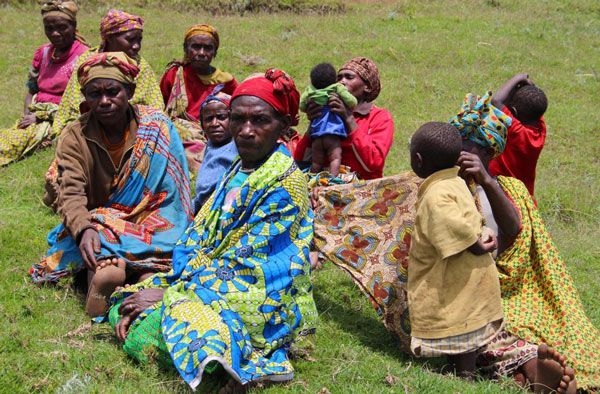
Indigenous minority groups in Uganda have five major problems that need to be addressed holistically
COMMENT | JULIUS ODEKE | Recently, I traversed the Rwenzori sub-region making it to almost all the sub-counties in the area, enjoying the beautiful landscape and the cultural and environmental atmosphere of the area.
It was not my first time, though being in Rwenzori region. The first time, I was there was in 2002 during the hand-over ceremony of the then Kasese Resident District Commissioner now a State Minister of Relief and Disaster Preparedness, Musa Ecweru. My programme at that time was highly controlled by the programme of the RDC and his security detail but this time around, I was a free man.
While in Bundibugyo – the heartland of the Bwamba people, one of the nine indigenous minority groups in Rwenzori sub-region, I happily met and had a luncheon talk with the Prime Minister of the Obudhingiya Bwa Bwamba (OBB), Wilson Mubulya. I have also developed a strong friendship network with the youth in the region, who were mostly my students at Kampala International University. I love them so much, for they are nice people.
Rwenzori region has the following indigenous minority groups: the Batuku who live in Ntoroko district, the Basongora, Bagabo, Bakingwe, and Banyabindi in Kasese District and the Batwa, Bavanuma, Bamba and Babwisi in Bundibugyo district.
“We are the original indigenous occupants of Rwenzori upper and lower lands. We share common features, but form distinct groups, with the only difference being in languages, art forms, traditional cultural practices and sources of livelihood,” the OBB Prime Minister said.
He cited some groups that have formal cultural institutional leadership recognised by Government, such as the Obudhingiya Bwa Bwamba.
According to the National Census of 2014, the minority groups in Rwenzori region are approximately 220,000 people. Countrywide, there are other minority groups that face the same challenges as the way those in Rwenzori do and they include the Ik in Kaabong district in Northeastern Uganda.
In my brief chat with Mubulya on that day, I noticed that he is a fine and honest man who loves his culture and wishes for everybody to have a sense of respected belonging. But I realised from his talk that the indigenous minority groups in Uganda seem to be experiencing many problems in the country that need to be addressed holistically.
In my talk with Mubulya, he said all the minority groups suffer several similar challenges such as the declining use of their mother languages, eviction from ancestral lands, limited political representation, and poor access to cultural sites.
The above challenges should expressly be solved by the government and I know the National Resistance Movement is a championed of people’s rights. Parliament of Uganda under the leadership of the Speaker Rebecca Kadaga and the Prime Minister, Ruhakana Rugunda the Leader of Government Business should address the above concerns.
Ugandans who hail from bigger ethnic groups such as the Baganda, Banyankole, Basoga, and Iteso should not be seen discriminating other people based on numbers. For those minority groups too, are people who deserve respect like any tribe. The only distinction is that they are few, which is not their making.
The indigenous minority groups in our country have given five current situations that they need government to come to their rescue and they include; land (access and boundaries), education and language, political representation, safeguard of the cultural heritage and identity and recognition.
However, the biggest concern for all minority groups is identity and recognition. There is a negative attitude leading to severe marginalisation of the minority groups as it’s perpetuated by the surrounding majority communities that use their numbers to justify their actions.
Yes, there is a tendency by many, mostly those from the majority communities to feel they are superior but note, “We are what we are, not by our own will but by God’s choice. So our different cultural norms, values, ethics and etiquette need to be respected not only quantitatively but also qualitatively.”
In Rwenzori region, I was told that even prices of items and medical services change depending on one’s identity: if one does not speak the dominant language, the costs are higher. While on the side of health facilities: if one’s names do not reflect belonging to the dominant community, then that person will not be quickly attend to or completely neglected.
This, therefore, has forced people from the minority groups to adopt names of those from the majority community in order to access medical care and this too, hence forcing the minority groups to have two or more national cards bearing different names for security, protection and for service delivery.
Why should such a thing happen to our fellow country citizens under the watch of a competent leadership of President Museveni, Kadaga and Ruhakana Rugunda and others and most importantly in the 21st Century?
To make matters worse, even in the recently concluded Local Council One elections, communities like the Batwa and Bavanuma in Bundibugyo; the Bagabo and Bakingwe in Kasese do not have any political representation. Communities such as Batwa, Banyabindi, Bakingwe, Bagabo, and Bavanuma to-date lack political representation at LC III level and this makes it difficult to contribute to the formulation and implementation of policies that affect the governance of such minority communities in the country.
We should know that despite supportive laws including the Uganda Constitution of 1995, it also weakens the capacity to advocate for human and cultural rights for the indigenous minority groups.
****
The writer is a journalist
 The Independent Uganda: You get the Truth we Pay the Price
The Independent Uganda: You get the Truth we Pay the Price





